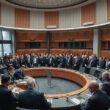The recent EU summit has ignited a fierce political row, with Germany’s Green party leadership accusing Chancellor Friedrich Merz and his CDU party of undermining crucial climate protection policies. Felix Banaszak, co-leader of the Greens, leveled a sharp rebuke, alleging that Merz is prioritizing delay and non-committal actions rather than shaping the European climate agenda.
The controversy centers on the 27 EU member states’ questioning of the planned expansion of the Emissions Trading System (ETS) to encompass heating and transportation by 2027. Germany’s government, under Merz’s leadership, reportedly joined other EU nations in raising doubts, a move Banaszak characterizes as a dismantling of vital environmental instruments. He specifically cited concerns from the Union regarding emissions trading, energy efficiency standards and the development of electric mobility.
“Under the guise of reducing bureaucracy, Europe’s climate target is being gradually eroded” Banaszak stated in an interview with ntv. He accused Merz of failing to demonstrate leadership within the EU Council and warned that this strategy risks sabotaging Germany’s ongoing energy transition, leading to increased energy insecurity and higher costs for consumers.
Beyond immediate policy reversals, Banaszak expressed deeper concerns about Germany’s diminishing influence in Brussels and the potential for lost technological leadership within the EU. He suggested that Merz’s perceived economic policy failures are actively obstructing Germany’s ability to advocate for ambitious climate action on the international stage, potentially resulting in a weak showing at upcoming COP conferences.
“The innovation-hostile course is detrimental to the many companies that have long since invested in the future” Banaszak asserted, signaling a growing rift within the German political landscape and raising questions about the country’s commitment to a sustainable and technologically advanced future within the European Union. The accusations point towards a potential shift in Germany’s EU strategy and suggest a brewing conflict between the Green party and the conservative CDU regarding the direction of European climate policy.





